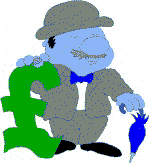| Currency |
- British currency is the Pound sterling - normally written £
- You will find notes worth £50, £20, £10, £5
- And coins worth 1p, 2p, 5p, 10p, 20p, and £1
- The government is always monkeying around with the money - remember
when we had pounds, shillings and pence. New coins are repeatedly being
introduced both in size and value (usually to make them smaller)
- Try to avoid getting £50 notes. The British are deeply
suspicious of them, and most places you try to spend them will assume
you are laundering drug money, and treat you accordingly.
- On balance the British still prefer real money to credit cards
- If in Scotland you will find they issue different bank notes. Both
English, Scottish and Northern Irish bank notes are legal tender anywhere
in Britain. However the English are deeply suspicious of "foreign" money
and may well decline to take the other notes. Best to change them to
English notes before you leave Scotland (or go to an English bank -there
should be no charge for changing it!)
|
| Banks |
- Opening hours are variable, but in large towns you should find a high
street bank open between 9.30 and 4.30
- In smaller towns banks may close at 3 p.m., close on odd days in the
week, and close on Saturdays
- Banks also close on public holidays
- They will change currency and travellers cheques, and normally charge
less than Bureaux de Change.
- You can find banks on all high streets ( they make so much money that
they can afford the rent). the main banks are Barclays, Lloyds, Midland
and National Westminster in England. And in Scotland the Royal Bank
of Scotland and the Bank of Scotland
|
| Cash Machines |
- referred to as "holes in the wall" by the British, and ATMs (Automatic
Teller Machine) by the banks
- With luck and a healthy bank balance at home, you can extract currency
from these machines night and day
- You find them outside banks, and also near tube stations and in large
supermarkets
|
| Credit Cards |
- The main cards used in Britain are Visa and MasterCard (still often
referred to as Access)
- American Express and Diners are more difficult to use. They charge
higher commissions to retailers and hence are not so widely accepted.
Leave them at home unless you really have no choice.
|
| Travellers Cheques |
- Get sterling travellers cheques before you leave home
- The British are not ready to accept even sterling travellers cheques
as part of a normal retail purchase - in other words they do not act
as cash everywhere
- However hotels should normally accept travellers cheques
- Change your cheques in a bank - if they are in sterling there should
be no charge for turning them into cash
- If you are carrying round travellers cheques in funny money (e.g.
US dollars), do not be surprised if nobody outside the banking system
will touch them. Change them at a bank before you try to spend them.
|
| VAT |
- Stands for "value added tax"
- You do not have to be bored with the details of how it is calculated,
you just need to know that it is effectively a sales tax.
- The government extract 17.5% of the value of everything we buy
- However you do not have to worry about the calculation. It is included
in all prices that you will see displayed. In other words your hotel
room rate, bus fare, pint of beer or ham sandwich will all have the
Vat already added when you see the displayed price
- So its not like the sneaky way they add sales tax on as an extra at
the checkout of US stores!
- There are ways of getting a refund of Vat on anything you export outside
the European Union. It is very complicated - the government do not want
you to go to the trouble of getting Vat back. If you have bought goods
that were very expensive in Britain, then ask the supplier how you claim
the vat back - on a Wedgwood dinner service or a Rolls Royce motor car,
it is probably worth the effort.
|
| Tipping |
- Happily tipping is dying out in Britain
- Taxis are about the only place where you will have real unpleasantness
if you do not tip them at least 10%
- Hotel prices normally include service - the odd hotel that insists
that service is an optional extra will make it very clear. There is
no need to add anything to bills that already include service
- If you do get a man to carry your bag, I guess he expects extra for
that, especially in large London hotels
|
|
|

